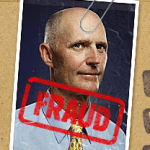The push to win newspaper endorsements has turned into a one-sided affair in the Florida governor’s race, with Republican Rick Scott effectively boycotting editorial boards while Democrat Alex Sink makes a big, homestretch pitch for support.
 Sink has scheduled interviews with five of the state’s major newspapers this week – following sit-downs last week with editors at three other Florida papers.
Sink has scheduled interviews with five of the state’s major newspapers this week – following sit-downs last week with editors at three other Florida papers.
Scott, meanwhile, plans no newspaper visits, although his campaign downplays the meaning of his snub of the decades-old tradition of courting the backing of Florida newspapers, whose endorsements are slated to appear in the final weekends leading to the Nov. 2 election.
“We’re just trying to get our message out to as many people in the best way we can,” Trey Stapleton, a Scott spokesman, said Monday. “Rick gets a lot of invitations to different events. It’s really a matter of weighing what’s the best situation.”
Opinion page editors say they’ve been frustrated trying to accommodate Scott, contacting the campaign via telephone and e-mail before his Republican primary victory over Bill McCollum and since then as the general election battle began.
“They never said `absolutely not’,” said Tim Nickens, editor of the St. Petersburg Times’ editorial page. “They just never really gave us an answer.”
Mike Lafferty, opinion editor at the Orlando Sentinel, told of a similar experience, which led him to a conclusion.
“It seems his campaign is focused on not getting into a controlled situation where you may face unfriendly questions,” Lafferty said. “It’s not that an editorial interview is necessarily unfriendly, but you go in knowing that you don’t have an escape hatch.”
A first-time candidate who has never held public office, Scott has spent close to $60 million of his own money on the governor’s race, with most of it going to television advertising. He also declined to take part in statewide debates during the primary race against McCollum, but agreed to join Sink in two statewide debates later this month.
Scott and Sink had their first television exchange — a limited-broadcast debate on Spanish-language Univision — Friday in Miami. Sink, though, had sought five statewide television contests and also has vigorously courted newspaper endorsements.
“We think editorial interviews help Floridians learn about where a candidate stands on issues and lets them see past 30-second television ads,” said Kyra Jennings, a Sink spokeswoman.
Sink is scheduled to meet this week with the Tampa Tribune, Tallahassee Democrat, Florida Times-Union, Napes Daily News and Miami Herald. Last week, she met with the Times, Palm Beach Post and Sun-Sentinel, Jennings said.
Scott did meet with the editorial board of the Lakeland Ledger a few weeks before the Aug. 24 primary. But those involved said the impromptu sit-down occurred during an unscheduled visit by the candidate to the paper’s offices.
In a swiftly changing media landscape, Scott’s choice to shun editorial writers also may be a sign that he sees diminished value in a newspaper’s backing. Most Florida newspapers have suffered dramatic circulation declines over the past three years, with many also retreating from the once-vast, multi-county regions they served.
In Texas, Republican Gov. Rick Perry has refused to meet with newspaper editorial boards saying, in effect, that they weren’t worth his time. “You know the world is really changing?put it all on the balance beam and the balance was toward not doing the editorial boards,” Perry told the Associated Press last week.
Peter Brown, assistant director of the Quinnipiac University Polling Institute, wrote about Scott’s unorthodox media approach last month for the Wall Street Journal. Brown, a former member of the Orlando Sentinel’s editorial board, said the Republican contender’s decision to avoid ed boards is part of a larger strategy.
“Since many Republican voters don’t like the media anyway, it made sense for him not to go to editorial boards during the primary,” Brown said. “For the general election, it’s a complicated question. But he’s a new candidate, running against the political establishment. Maybe he sees editorial boards as being part of that establishment.”
Editorial boards, however, don’t see themselves that way. Some editors said Scott is missing an opportunity to explain his policies on jobs, state government, and the state’s tax system to newspapers which still command readerships in the hundreds of thousands.
“Jeb Bush understood the value of being able to explain his position on policies even if the editorial boards disagreed with him a lot of the time,” Nickens said. “But by talking to the board, he could definitely affect the tone of where you came down on an issue.”
Stapleton, though, said Scott regularly makes himself available to print, digital and television reporters in news gaggles following campaign appearances. He said the candidate is not ducking the media or looking to avoid tough-edged questioning.
“I don’t know if you can control the message as much as people say we are,” Stapleton said. “Every interview could be a hostile situation. And we do press gaggles after every event.”
By John Kennedy
The News Service of Florida


